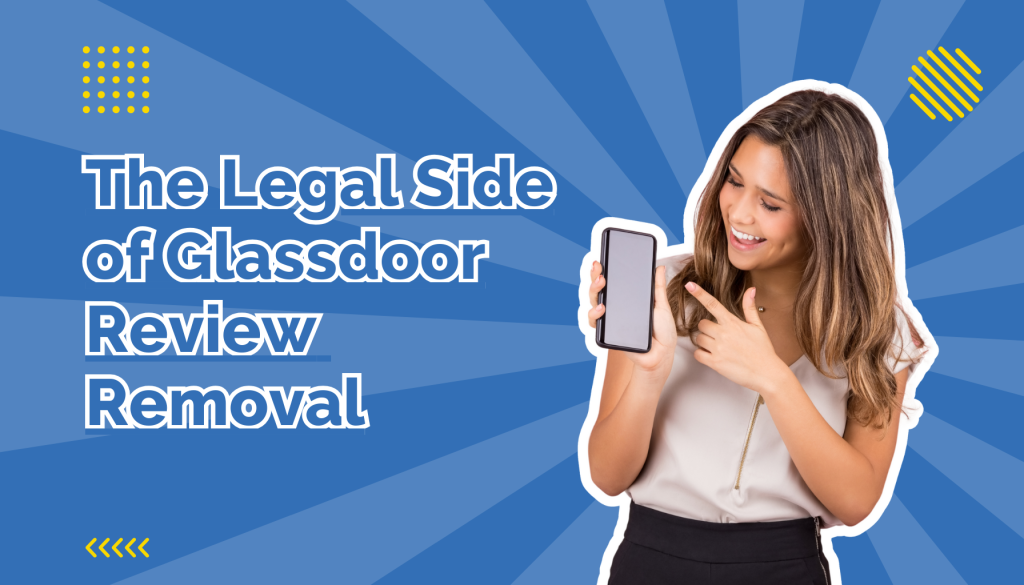Online reviews can significantly impact a company’s reputation and bottom line. Platforms like Glassdoor have become influential, providing insights into companies from the perspective of current and former employees. However, not all reviews are positive or, in some cases, fair or accurate. This brings us to the intricate process of how to delete Glassdoor reviews, a topic that intertwines legal considerations with corporate reputation management. Take a closer look at the legal side of removing reviews from Glassdoor, exploring the challenges, strategies, and implications involved.
Understanding the Basis of Glassdoor Review Removal
Glassdoor operates on the principle of allowing anonymous users to share their employment experiences, which can range from salary details to workplace culture insights. While this transparency can be valuable for job seekers, it can also pose challenges for employers, especially when faced with negative or potentially defamatory content. The first step in considering Glassdoor review removal is understanding the legal groundwork that underpins what can and cannot be removed from such platforms.
When discussing the removal of negative reviews, several key points underpin the legal landscape, particularly relating to defamation law and the protection offered to online platforms by legislation:
- Defamation Law and Negative Reviews:
- A review is potentially defamatory if it includes false statements that can harm the reputation of an individual or a company.
- The challenge in proving defamation lies in demonstrating not just the harmful nature of the review, but also its falsehood. This is often a complex and difficult legal threshold to cross.
- Legal Protections for Online Platforms:
- The U.S. Communications Decency Act, specifically Section 230, plays a crucial role by providing immunity to online platforms such as Glassdoor.
- This immunity shields these platforms from being held liable for content generated by users, including reviews that might be considered defamatory.
These elements together create a nuanced and challenging environment for the removal of negative reviews, requiring a careful navigation of both legal considerations and the specific policies of platforms like Glassdoor.
Navigating the Legal Path to Review Removal
The process of Glassdoor review removal requires a nuanced understanding of legal rights and the platform’s policies. Companies seeking to remove a review must typically demonstrate that the content violates Glassdoor’s guidelines, such as containing personal attacks, profanity, or identifiable information. However, simply disagreeing with a review’s sentiment or finding it harmful to the company’s reputation is not enough for legal removal.
In instances where a review is potentially defamatory, companies might consider legal action against the poster. This, however, involves identifying the anonymous poster, which can be challenging and may require a court order. The feasibility of this approach depends on the severity of the review’s impact and the company’s willingness to pursue legal channels, balancing the potential benefits against the costs and public relations implications.
Ethical and Strategic Considerations
While exploring legal avenues for Glassdoor review removal, companies must also weigh ethical considerations. Attempting to suppress legitimate employee feedback can backfire, damaging trust and employer branding. Transparency and openness to criticism are often more effective in the long run, suggesting that companies should focus on addressing underlying issues rather than solely on removing negative reviews.
Strategically, companies can mitigate the impact of negative reviews by actively engaging with their Glassdoor profile, responding to reviews in a constructive manner, and encouraging satisfied employees to share their positive experiences. This approach not only demonstrates responsiveness but also helps balance the overall perception of the company on the platform.
The Role of Legal Advice and Reputation Management
Given the complexities involved in Glassdoor review removal, seeking legal advice can be crucial. Legal experts can help companies understand their rights, evaluate the potential for successful removal, and navigate the submission of takedown requests in cases where reviews violate specific guidelines or laws. Additionally, legal counsel can provide guidance on the risks and benefits of pursuing further action against defamatory posts.
Reputation management services also play a key role, offering expertise in monitoring online presence, responding to reviews, and developing strategies to improve company perception. These services can be particularly beneficial for companies looking to maintain a positive online reputation without delving into the potential pitfalls of legal action.
Embracing Transparency
The legal side of Glassdoor review removal is fraught with challenges, requiring a careful balance of legal, ethical, and strategic considerations. While there are avenues for legally contesting defamatory or guideline-violating reviews, companies must also recognize the limitations and potential downsides of pursuing removal. Ultimately, embracing transparency, addressing feedback constructively, and investing in positive employer branding may offer the most sustainable path to managing online reputation in the age of Glassdoor and beyond. By understanding the legal landscape and adopting a holistic approach to reputation management, companies can navigate the complexities of review removal while fostering a positive and transparent workplace culture.
Remove negative reviews from Glassdoor
Guaranteed Removals Glassdoor review removal service
Guaranteed Removals Glassdoor review removal service focuses on removing fake and defamatory Glassdoor reviews. Our services aim to enhance and protect your reputation and reduce the risk of unwanted exposure online.
There is no obligation or risk. You only pay after we permanently remove the negative reviews from Glassdoor.
Get started and take control of your online presence today.

